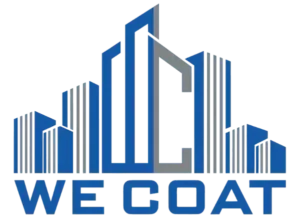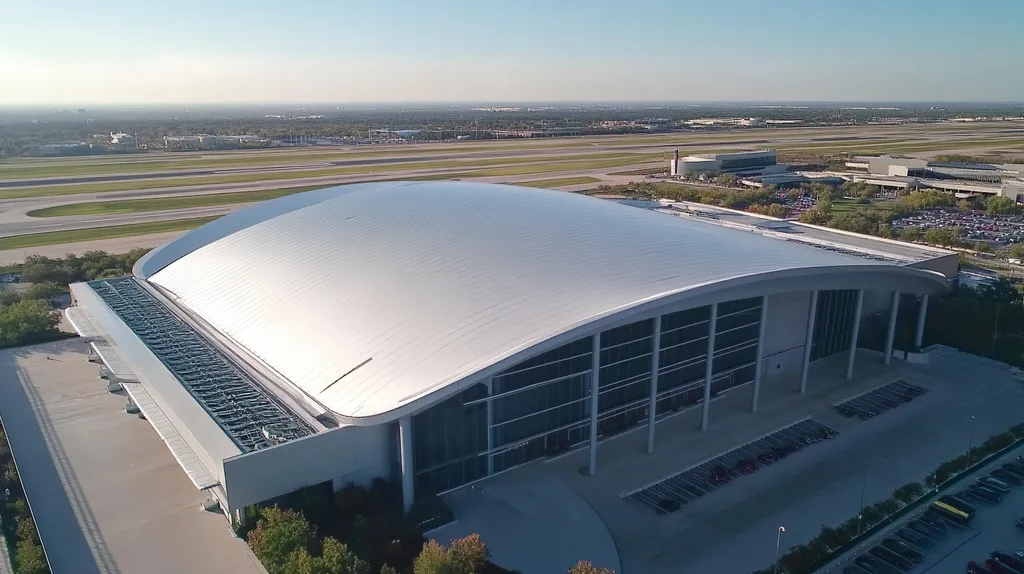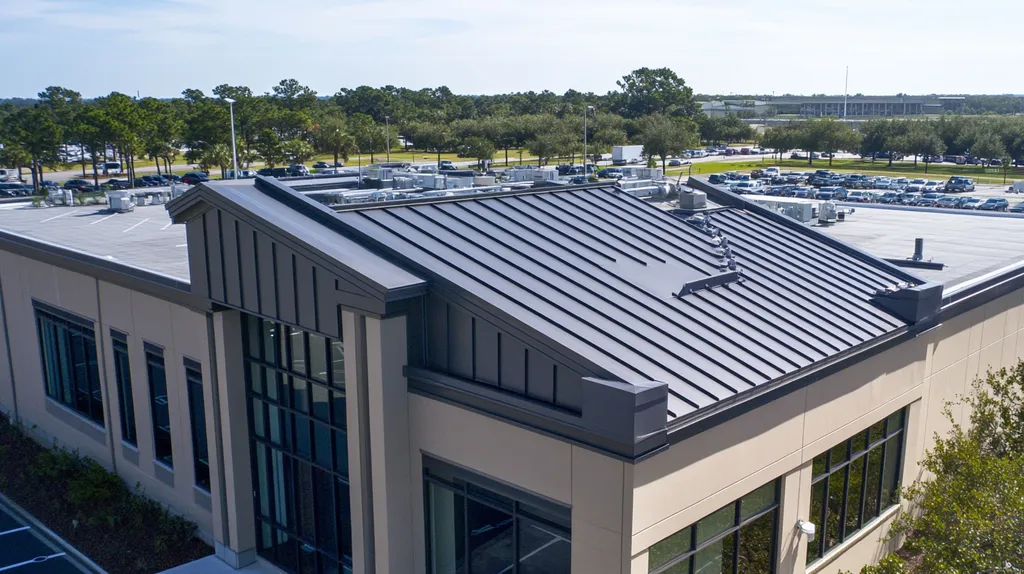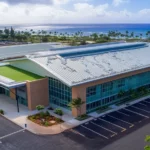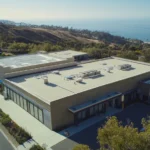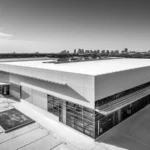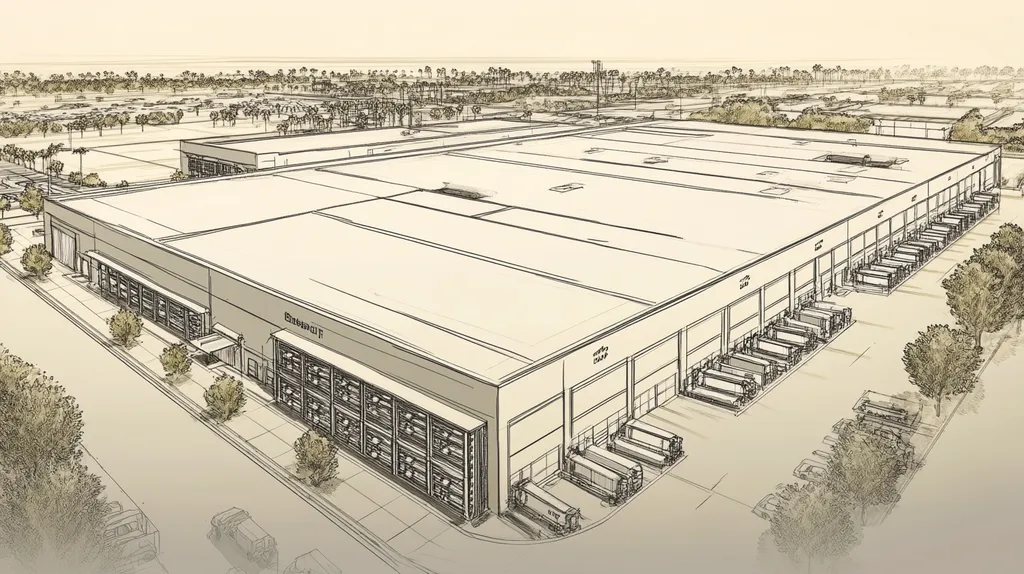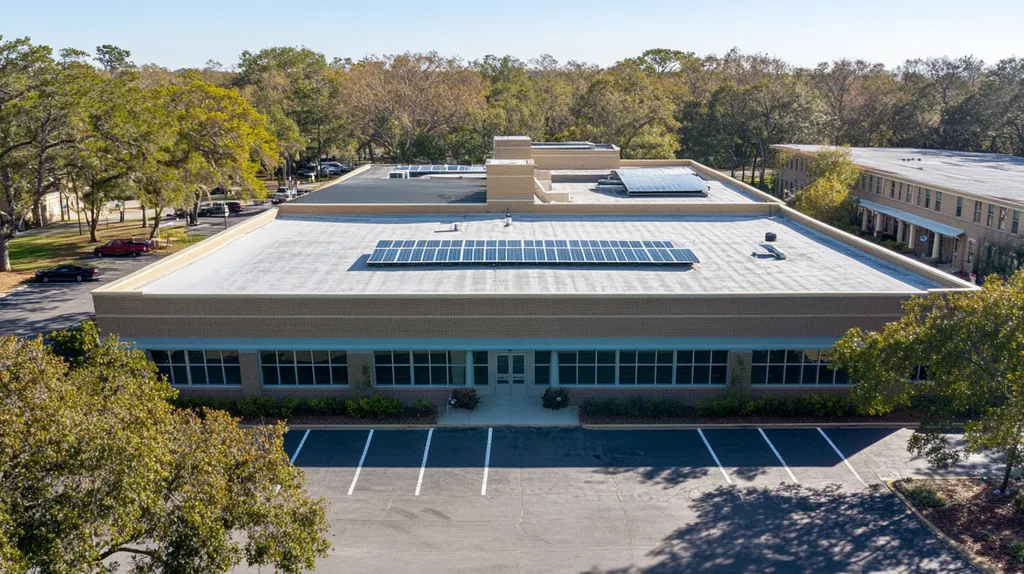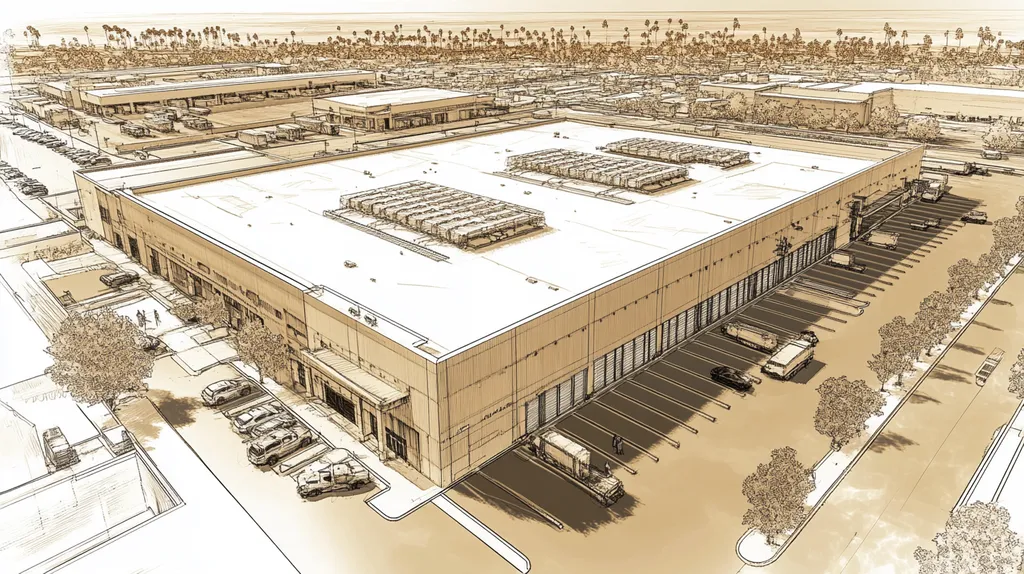Welcome to today’s Battle Royale featuring two roofing heavyweights: “Professional Services” in the east corner versus “DIY Approaches” in the west!
Tonight’s showdown pits these contenders against each other across six punishing rounds designed to test every aspect of their performance for Commercial Roofing Decisions.
At stake? Millions in potential costs, decades of building protection, and the critical performance demands of modern commercial and industrial facilities.
Our professional judging panel will evaluate each round on technical merit, real-world performance, and value delivery. After all six rounds, we’ll declare our ultimate champion.
Ladies and gentlemen, facility managers and building owners… it’s time to rumble!
ROUND 1: INITIAL COSTS & INSTALLATION
Commercial roofing decisions carry substantial financial implications, with a single poor choice potentially leading to hundreds of thousands in unexpected costs. The initial investment in a commercial roof typically ranges from $350,000 to over $1 million for large facilities, making the decision-making process critical for business sustainability.
Property owners face a crucial choice between professional guidance and self-directed approaches when navigating these high-stakes decisions. This comparison examines the trade-offs between professional consultation and DIY planning across three key areas.
Material Expenses
Material selection represents 40-60% of total roofing project costs. Professional roof consultants maintain current knowledge of material pricing trends, performance data, and regional climate considerations that impact material longevity.
These specialists can identify optimal materials that balance durability and cost-effectiveness. They often secure preferred pricing through established supplier relationships and help avoid costly specification errors.
DIY approaches typically rely on limited market research and vendor-supplied information. This can result in over-specification of expensive materials or selection of inadequate products that fail prematurely.
Based on superior material optimization and cost control, Option 1: Roof Consultant Assistance holds an ADVANTAGE in this category.
Installation Complexity
Modern commercial roofing systems involve intricate components and precise installation requirements. Professional consultants develop detailed specifications that account for building codes, manufacturer warranties, and site-specific challenges.
Consultants coordinate with contractors to ensure proper installation sequencing and quality control measures. They can quickly identify and resolve technical issues that arise during installation.
DIY planning often overlooks critical installation details and compliance requirements. This can lead to warranty violations, code violations, and installation delays.
The expertise gap in managing complex installations gives Option 1: Roof Consultant Assistance a clear ADVANTAGE.
Project Timeline
Commercial roof installations typically span 2-8 weeks depending on scope and complexity. Professional consultants develop realistic schedules incorporating weather contingencies, material lead times, and crew availability.
They coordinate multiple trades, manage permitting processes, and ensure efficient project flow. Their experience helps anticipate and prevent common delays before they impact the timeline.
DIY project management often underestimates timeline requirements and lacks contingency planning. Weather delays, material shortages, and coordination issues frequently extend projects beyond planned completion dates.
For superior timeline management and delay prevention, Option 1: Roof Consultant Assistance claims another ADVANTAGE.
ROUND 1 WINNER: Roof Consultant Assistance
ROUND 2: DURABILITY & LIFESPAN
Commercial roofing durability directly impacts business continuity and property value. Industry data shows that 85% of premature roof failures stem from poor initial decisions about materials and installation methods. A failed roof can lead to inventory damage, equipment losses, and business interruption costs exceeding $500,000 for a typical commercial facility.
The stakes are particularly high for facilities operating expensive equipment or maintaining climate-controlled environments. Every hour of roof-related downtime represents significant revenue loss and potential damage to business relationships.
Material Selection and Performance
Single-ply membranes like TPO, PVC, and EPDM represent the most durable options for commercial applications. These materials offer superior resistance to UV radiation, chemical exposure, and temperature fluctuations while remaining cost-effective for large installations. (source: Solutions GC)
Professional consultants evaluate facility-specific factors like mechanical equipment placement, roof traffic patterns, and local weather conditions to select optimal materials. They also consider compatibility between different roofing components to prevent premature degradation.
DIY material selection often prioritizes initial cost over long-term performance. Without professional guidance, owners may choose materials unsuited to their specific application or climate zone.
ADVANTAGE: Roof Consultant Assistance
Installation Quality Control
Professional installation oversight ensures proper material handling, seam welding, and detail work. Consultants verify that contractors follow manufacturer specifications and maintain appropriate environmental conditions during installation.
Quality control measures include systematic inspection of critical areas like flashings, penetrations, and drainage components. Consultants document installation progress and address deficiencies before they become costly problems.
DIY supervision lacks the technical expertise to identify subtle installation errors. Without professional oversight, improper techniques may go unnoticed until system failure occurs.
ADVANTAGE: Roof Consultant Assistance
Lifecycle Management
Proper lifecycle management extends roofing system longevity by 40-60%. Professional consultants develop comprehensive maintenance programs tailored to specific roof assemblies and usage patterns.
These programs include regular inspections, preventive repairs, and documentation of system condition. Consultants help facility managers anticipate replacement needs and budget accordingly.
DIY maintenance approaches tend to be reactive rather than preventive. Without structured programs, minor issues often escalate into major problems requiring extensive repairs.
ADVANTAGE: Roof Consultant Assistance
ROUND 2 WINNER: Roof Consultant Assistance
ROUND 3: PERFORMANCE FACTORS
Performance factors in commercial roofing directly impact business operations and asset protection. Industry data shows that 35% of commercial buildings experience significant operational disruptions due to roofing system failures within the first five years of installation. These disruptions cost U.S. businesses over $2.5 billion annually in lost productivity, damaged inventory, and emergency repairs.
The consequences of poor performance extend beyond immediate repair costs to include increased energy consumption, accelerated deterioration, and potential liability issues. Addressing these factors requires careful consideration of structural requirements, environmental conditions, and long-term maintenance needs.
Structural Compatibility
The physical structure of a commercial building determines which roofing systems will perform optimally. Load-bearing capacity, deck type, and existing roofing materials all influence system selection and installation requirements. (source: Kevin Szabo Jr Plumbing)
Professional consultants conduct thorough structural evaluations to identify potential issues before they impact performance. They analyze drainage patterns, assess equipment loads, and verify compatibility with existing building systems.
DIY approaches often overlook critical structural considerations, leading to inappropriate system selection. Without professional analysis, owners may choose roofing solutions that exceed load limits or create drainage problems.
Based on superior technical analysis capabilities, Option 1: Roof Consultant Assistance claims an ADVANTAGE.
Weather Resistance
Commercial roofs must withstand extreme weather conditions while maintaining their protective function. Regional climate patterns, UV exposure, and seasonal temperature variations all affect system performance and longevity.
Professional consultants select materials and design details specifically engineered for local weather conditions. They incorporate appropriate safety factors and redundant protection measures against severe weather events.
DIY planning typically relies on general recommendations that may not address specific regional challenges. This can result in insufficient weather protection and premature system failure.
For superior weather resistance planning, Option 1: Roof Consultant Assistance holds an ADVANTAGE.
System Integration
Modern commercial roofs must integrate seamlessly with HVAC equipment, solar installations, and other building systems. Poor integration leads to performance issues and increased maintenance costs.
Professional consultants coordinate with multiple trades to ensure proper system integration. They develop detailed specifications for penetrations, equipment supports, and access requirements.
DIY approaches struggle to manage complex system interactions effectively. Without professional oversight, integration issues often create ongoing performance problems.
The expertise gap in system integration gives Option 1: Roof Consultant Assistance another ADVANTAGE.
ROUND 3 WINNER: Roof Consultant Assistance
ROUND 4: MAINTENANCE REQUIREMENTS
Maintenance decisions dramatically impact commercial roof longevity and performance. Industry data shows that 85% of premature roof failures stem from inadequate maintenance practices, leading to an average of $2.50 per square foot in additional repair costs annually. For a typical 100,000-square-foot commercial facility, poor maintenance choices can result in $250,000 of unnecessary expenses each year.
The contrast between professional maintenance oversight and DIY approaches reveals stark differences in outcomes, costs, and system reliability. These differences become particularly evident when examining inspection protocols, repair strategies, and long-term planning.
Inspection Protocols
Professional roof consultants implement systematic inspection schedules that catch problems early. These programs typically include quarterly visual inspections, bi-annual detailed assessments, and specialized evaluations after severe weather events.
Consultants utilize advanced diagnostic tools like infrared scanning and moisture mapping to detect hidden issues before they cause visible damage. Their expertise allows them to identify subtle warning signs that indicate developing problems.
DIY maintenance often relies on sporadic visual checks without proper documentation or follow-up. Without professional tools and training, many serious issues go undetected until they cause significant damage.
ADVANTAGE: Roof Consultant Assistance
Repair Strategies
Professional consultants develop proactive repair strategies based on comprehensive system understanding. They prioritize repairs based on urgency and coordinate work to minimize disruption to building operations.
Consultants ensure repairs meet manufacturer specifications and maintain warranty compliance. They document all work performed and maintain detailed repair histories that inform future maintenance decisions.
DIY approaches typically address problems reactively as they become visible. This leads to emergency repairs that cost 3-4 times more than planned maintenance and may void warranties through improper repair methods.
ADVANTAGE: Roof Consultant Assistance
Long-term Planning
Selecting appropriate roofing materials directly impacts maintenance requirements and long-term performance. Professional consultants evaluate durability, climate adaptability, and maintenance needs when recommending specific systems. (source: One Day Roofing)
Consultants create detailed maintenance budgets that account for regular upkeep, planned repairs, and eventual replacement. This systematic approach prevents surprise expenses and ensures adequate funding for proper maintenance.
DIY planning often underestimates maintenance requirements and fails to budget appropriately. This leads to deferred maintenance and accelerated deterioration of roofing systems.
ADVANTAGE: Roof Consultant Assistance
ROUND 4 WINNER: Roof Consultant Assistance
ROUND 5: SUSTAINABILITY CREDENTIALS
Sustainability credentials have become critical factors in commercial roofing decisions, with significant financial implications. Studies show that sustainable roofing choices can reduce energy costs by up to 30% and increase property values by 7-10%. These decisions impact not just environmental footprint, but also operational costs and regulatory compliance.
Poor sustainability choices in commercial roofing lead to excessive energy consumption, increased maintenance requirements, and potential compliance issues. For a typical 100,000-square-foot facility, inadequate sustainability planning can result in $75,000 or more in unnecessary annual energy costs.
Environmental Impact Assessment
Professional roof consultants conduct thorough environmental impact assessments that consider material composition, manufacturing processes, and end-of-life recyclability. They evaluate factors like embodied carbon, volatile organic compounds (VOCs), and potential environmental hazards.
These specialists maintain current knowledge of green building standards and certification requirements. Their expertise ensures compliance with evolving environmental regulations while maximizing sustainability benefits.
DIY approaches often lack the tools and expertise to properly evaluate environmental impacts. This can result in selecting materials that appear sustainable but actually contribute to greater environmental harm through their lifecycle.
Based on comprehensive assessment capabilities, Option 1: Roof Consultant Assistance claims an ADVANTAGE.
Energy Performance Optimization
Commercial roof systems significantly impact building energy performance through heat absorption, reflection, and insulation properties. Professional consultants analyze thermal performance using advanced modeling tools to optimize energy efficiency.
They specify appropriate insulation levels, reflective coatings, and ventilation systems based on climate zone and building use. These recommendations typically result in 20-35% energy savings compared to standard installations.
DIY planning generally relies on basic energy calculations that miss opportunities for optimization. Without professional analysis, buildings often experience higher cooling costs and reduced comfort levels.
For superior energy performance planning, Option 1: Roof Consultant Assistance holds an ADVANTAGE.
Certification Management
Professional consultants navigate complex certification processes for LEED, Energy Star, and other sustainability programs. They understand documentation requirements and ensure roofing choices support certification goals.
These specialists coordinate with certification authorities and maintain required records throughout the project. Their expertise helps avoid common pitfalls that could jeopardize certification status.
DIY approaches struggle with certification complexity and documentation requirements. Without professional guidance, projects often fail to achieve desired certifications or incur additional costs through repeated submission attempts.
The expertise gap in certification management gives Option 1: Roof Consultant Assistance another ADVANTAGE.
ROUND 5 WINNER: Roof Consultant Assistance
ROUND 6: SPECIALIZED APPLICATIONS
Specialized commercial roofing applications present unique challenges that directly impact building performance and safety. Industry data shows that 40% of specialized roofing installations fail within the first three years when implemented without proper expertise, resulting in average remediation costs exceeding $200,000 per project.
These specialized systems, including green roofs, solar installations, and high-security facilities, require precise technical knowledge and careful coordination between multiple building systems. The consequences of improper installation extend far beyond basic waterproofing concerns.
Material Suitability
Specialized commercial applications demand specific material characteristics that differ significantly from standard roofing installations. The unique requirements of data centers, manufacturing facilities, and clean rooms create complex material selection challenges.
Professional consultants evaluate material compatibility with facility operations, environmental conditions, and regulatory requirements. They understand how different materials interact with specialized equipment and maintain detailed knowledge of emerging product innovations.
TPO roofing systems offer excellent compatibility with many specialized applications, providing low installation costs while maintaining high performance standards. (source: Heidler Roofing Blog)
DIY approaches often rely on general-purpose materials that fail to address specific operational needs. Without expert guidance, facilities risk selecting materials that compromise specialized functions or create long-term compatibility issues.
ADVANTAGE: Roof Consultant Assistance
Integration Requirements
Modern specialized roofing must seamlessly integrate with complex building systems including HVAC, electrical, and security infrastructure. Poor integration leads to system failures and compromised facility operations.
Professional consultants coordinate with multiple engineering disciplines to ensure proper system integration. They develop detailed interface specifications and oversee critical connection points between roofing and facility systems.
DIY planning typically lacks the technical depth to properly coordinate multiple building systems. This results in conflicts between roofing components and specialized equipment that compromise overall facility performance.
ADVANTAGE: Roof Consultant Assistance
Performance Verification
Specialized applications require comprehensive testing and verification protocols to ensure system performance. Standard inspection methods often prove inadequate for these complex installations.
Professional consultants implement specialized testing procedures tailored to facility requirements. They utilize advanced diagnostic equipment and maintain detailed performance documentation throughout the installation process.
DIY approaches generally lack access to necessary testing equipment and verification protocols. Without proper performance validation, specialized systems may operate below required standards or fail prematurely.
ADVANTAGE: Roof Consultant Assistance
ROUND 6 WINNER: Roof Consultant Assistance
AND THE WINNER IS…
Ladies and gentlemen, after six punishing rounds of technical evaluation, we have a decisive victory! In a stunning performance that dominated every category, PROFESSIONAL ROOF CONSULTANT ASSISTANCE emerges as our undisputed champion!
The champion’s devastating combination of technical expertise, lifecycle cost control, and risk management proved unbeatable across all six rounds. Most impressive was its commanding performance in specialized applications, sustainability credentials, and maintenance protocols.
While DIY approaches showed admirable cost-saving potential for simple, low-risk projects on smaller commercial properties, they ultimately couldn’t match the champion’s comprehensive capabilities when facing complex commercial roofing challenges.
IMPORTANT NOTICE: This analysis reflects general industry trends and typical outcomes. Individual building requirements, local climate conditions, and specific property characteristics can significantly impact results. Every commercial property faces unique challenges that require careful evaluation. Property owners and managers should consult qualified professionals who can assess their specific situation before making final roofing decisions.
And there you have it, folks! In the high-stakes arena of commercial roofing, professional consultation stands tall as the heavyweight champion of long-term performance and value. Remember: when millions in property protection hang in the balance, choosing the right corner can mean the difference between victory and technical knockout!
FREQUENTLY ASKED QUESTIONS
Q. What are the initial costs for a commercial roof?
A. Initial costs for a commercial roof can range from $350,000 to over $1 million, depending on facility size and complexity. These substantial financial implications highlight the importance of informed decision-making. A poor choice in roofing can lead to significant unexpected expenditures, further underlining the need for professional assistance in evaluating options.
Q. How does roof durability impact industrial roof decisions?
A. Durability directly impacts operational continuity and property value. Poor decisions during material selection can lead to premature roof failures, causing business interruptions and excessive repair costs. Experts identify appropriate materials, minimizing the risk of failure through careful consideration of environmental factors, ensuring long-term performance commensurate with investment.
Q. What performance factors should I consider for a commercial roof?
A. Performance factors include structural compatibility, weather resistance, and system integration. Each aspect directly affects the operational efficiency and longevity of the roof. By involving a professional consultant, property owners ensure that roofing systems align with both building needs and environmental conditions, mitigating potential risks and optimizing functionality.
Q. How vital is maintenance for commercial roof longevity?
A. Proper maintenance is crucial as inadequate practices account for 85% of premature failures, leading to substantial repair costs. Systematic inspections and proactive repairs ensure that any potential issues are addressed before they escalate. Investing in a professional maintenance program can significantly extend the life and performance of roofing systems.
Q. What are the sustainability considerations for an industrial roof?
A. Sustainability credentials can significantly affect energy costs and property value. Professional consultants assess environmental impacts, ensuring materials and designs comply with green standards. This approach not only enhances energy efficiency but also helps in achieving certifications that provide long-term financial and operational benefits.
Q. What challenges arise from specialized roofing applications?
A. Specialized applications face unique challenges, requiring meticulous planning and expertise. Issues such as material compatibility and integration with existing systems can lead to costly failures if not properly managed. Professionals with experience in these systems help navigate complexities, ensuring optimal performance and safety for each unique application.
Q. When should I engage a roof consultant for my commercial roof?
A. Engaging a roof consultant is advisable during initial planning, material selection, or when facing repair decisions. Their expertise can help navigate complexities and optimize material choices, ensuring quality outcomes. Regular consultations throughout the maintenance of your industrial roof also provide peace of mind, safeguarding your investment against unforeseen issues.
